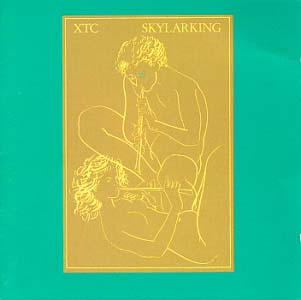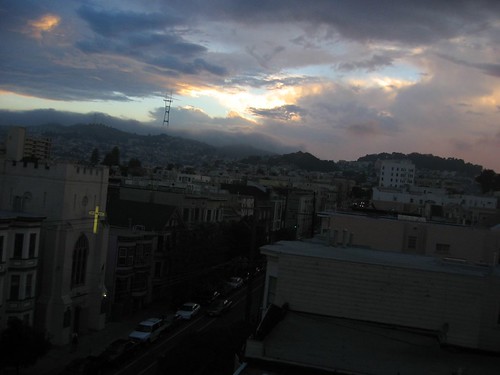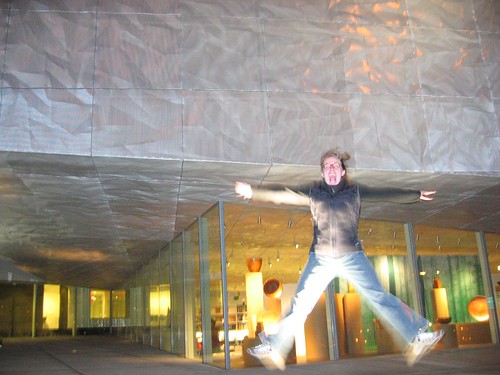I've been bugging out on Google calendars recently, and I found a really nifty one for this year's World Cup. Others: Bottom of the Hill shows (rock n roll!), Giants games (hey, batter), Dolores Park movie nights (bring: jacket, beer).
Category: tip
Items containing recommendations, suggestions, or red-hot gossip.
Free WiFi to roll into SF
So apparently Google and Earthlink are teaming up to provide free WiFi service to all of SF (via Gizmodo). While we're still a ways from knowing what this will actually mean — mainly, will be accessible at 14th and Valencia, third floor apartment? — it is intriguing to me that Google is involved. Unlike Earthlink, Google has never gouged me, or failed to provide service that I've paid for, or sold my name and home address to direct marketers.
So I guess you could say that I'm hopeful. Maybe someday soon I'll be able to work from Pac Bell (er, I mean, SBC … er, I mean AT&T) Park, or Buena Vista Park, or the little redwood grove outside the Transamerica building.
Or from my roof. (See the photo).

Here's my question: How did this become the "Dear God" album, considering at least half the songs on it are as good or better? Damn you, Sarah McLachlan. I hadn't listened to it since maybe 1995, when Ted and I played the shit out of it. We both loved the Beatles, and I had a fondness for the synthy 80's style. This album combines these qualities, and adds a little indie rock sensibility as well.Now that the Cars and Hall & Oates have been on heavy hipster rotation for the past year or so, I'm surprised that XTC haven't seen some props, especially for this album. Compared to other XTC albums, the vocals are more blended with the rest of the sound, rather than held above it, which reduces the saccharine edge of later albums (Oranges & Lemons, for instance). Maybe XTC just doesn't have the kitschy cache of other 80's bands, who knows?Incidentally, you can read more about the most well-known song on the album. Here's a fan of Sarah, explaining why it's okay to love Sarah even if she questions the existence of God: "I do not believe that you should rule out a whole singer or album just because of one song that you do not care for."

Most of my records, CDs and tapes sit idly in crates and on shelves, so here's what I'm going to do: Every so often, I'm going to dust one off and see what it sounds like. Dredge the archive, and take a good long listen to something I haven't heard in 2+ years.
Tonight, I begin the experiment with a randomly selected record: Sleater-Kinney's All Hands on the Bad One, which I'll admit I haven't listen to in three years. Maybe four.
Here's the thing about Sleater-Kinney and me. I'm probably one of the very few San Franciscans (of a certain age and neighborhood) who *likes* them but doesn't *love* them and sometimes wishes they would cool it with the too-often shrill vocals. But of course everyone knows they're politically-active feminists who play punk rock, so what's my problem?
Let's talk about Bad One. It's got great moments: the title track and "The Professional" are rockin and fun — even after five years, they're a couple of the all-time great songs to listen to while riding a bike. The problem is that, for the most part, this album is huge step away from their early, raw sound, which had a lot less Heart-esque power ballad voice. Songs like "Milkshake n Honey," and "Ballad of a Ladyman" feature this voice, which for me is the element of their sound that rocks the least. (It comes down to this: If Carrie Brownstein harmonizes with Corin Tucker on a song, chances are that I'll like it).
I'll say something nice about them: I saw them move the crowd in a serious way at Dolores Park one summer. Their fans were freaking out, and the band itself was having fun and sounding good — even songs I didn't like were pretty great. I really wish their albums captured this better. But like anything, their sound can't be all things for all people, and they seem to please some group of people everytime they put out an album, so more power to them.
The Twin Cities are still full of good times, especially when the mercury plunges. A couple of weekends ago, I enjoyed the chill with my friends Fish, Katie and Becky (pictured, in front of the new wing at the Walker). The highlights:
- Vietnamese sandwiches at the Jasmine Deli on Nicollet. Their sandwiches are fabulous, especially the BBQ chicken.
- The new and improved Walker. Twin Cities residents seem ambivalent — some love it, others are underwhelmed — but I was really impressed with the way that the new wing blends into the old, and the manner in which they space itself still seems intimate and surprising. Plus, it's open late on Friday nights; how great is that? The Walker's video installations have always been great, and I was really glad to catch a few moments of Jem Cohen's "Lost Book Found" and "Blood Orange Sky" as we walked through — worth reading: A long, detailed interview with Jem Cohen by Rhys Graham. Also, an entire room dedicated to Sherrie Levine, a cabinet full of Fluxus stuff (still cool after all these years of imitators), and a great exhibit of Huang Yong Ping that included some live spiders and scorpions.
- Good, solid Midwestern dishes prepared Chez Panisse-style (local, organic, a little French) at Auriga. They also serve Kona coffee.
- Weird Norweigan snacks and crazy folk-art murals at Ingebretsons, a store that sells all sorts of Scandanavian crafts and gifts. Even weirder because it's in a somewhat bombed-out part of Lake Street.
- A little waterfall in the middle of the city, Minnehaha Falls. Totally worth seeing, especially in winter.
- Fish and Katie's totally awesome 60's‑style neighborhood movie theater, The Riverview, that shows fairly new movies for THREE DOLLARS. Are you kidding me? Plus, it has been totally restored, and totally reminds me of the heyday of Kansas City's Glenwood, which I think has recently been gutted of all the 60's schmaltz.
Fresh Air interview w/ Mike Mills
Mike Mills is a graphic designer, director of many excellent music videos (among them: "Kelly Watch the Stars," by Air, the one with the 70's‑looking slow-motion ping-pong players), and all-around aesthetic bad-ass. Terry Gross interviewed him on Fresh Air a couple of weeks ago, and you can check out the archived version on the NPR website. It includes a funny anecdote about his experience as an apprentice for a well-known Scottish artist — at the risk of giving away the ending, Mills didn't assist in the creation of the work as much as he created the work for the artist, who was too hungover to do it himself. Here's a really comprehensive collection of his video work, including "Kelly Watch the Stars."Incidentally, when I was growing up, a different Mike Mills was the bassist for my favorite rock band c. 1985–88 — REM. You can hear his thin, poignant harmonizing on Murmur, Reckoning, Fables of the Reconstruction, Life's Rich Pageant, Dead Letter Office, and Document. (Don't bother with anything after Document; it's all downhill from there). Let's hear it for all Mike Millses!
Law nerds around the country are providing interesting commentary of the Roberts confirmation. SCOTUSblog provides a blow-by-blow account of the posturing and intermittent questioning of the senators alongside interesting legal commentary, but it's a blog, so you have to scroll down to the bottom and read upwards if you want to read chronologically. Balkinization, a blog that includes many quite interesting essays by Yale Law professor Jack Balkin, has an interesting discussion about why Democrats should not confirm Roberts. Balkin recently published an interesting piece in Slate about originalists and the concept of a living constitution: "Alive and Kicking: Why no one truly believes in a dead Constitution."If you're willing to sift through the details — and each memeber of the Senate Judiciary Committee tends go into excessive detail before getting to his/her question — the NYT has raw transcripts: Day 1, Day 2.
Has there been a more thankless task in modern literary history than editing Hunter S. Thompson? According to former Rolling Stone editor Robert Love, the magazine actually assigned junior editors the task of babysitting Thompson as he approached his deadline. (Okay, there are worse junior editing tasks than that; I've done them). In a recent in the Columbia Journalism Review article, Love discusses this and much more in his essay about editing the good doctor at Rolling Stone. Charming revelation: HST's bluster and bombast attained readability only after long, hard editorial oversight. The kind of oversight that involves tearing the thing apart and and reassembling it sentence by sentence:
So, a flurry of manuscript pages would arrive, buzzing with brilliant, but often disconnected passages, interspersed with what Hunter would himself call "gibberish" (on certain days) and previously rejected material, just to see if we were awake. "Stand back," the first line would inevitably say, announcing the arrival of twenty-three or twenty-five or forty pages to follow in the fax machine. Soon there were phone calls from Deborah Fuller or Shelby Sadler or Nicole Meyer or another of his stalwart assistants. We always spoke of "pages," as in "How many pages will we get tonight?" "We need more pages than that." "Can you get those pages marked up and back to Hunter?" Pages were the coin of the realm; moving pages was our mission. I would mark them up, make copies for Jann, and then send them back.
The issue for the magazine was never that Hunter wasn't the funniest, cleverest, most hilarious writer, sentence to sentence or paragraph to paragraph. The editor's role was getting those sentences to pile up and then exhibit forward momentum. (Hunter called this process "lashing them together.")
I've never met anyone who enjoyed an installment of the second Star Wars trilogy — Phantom Menace, Attack of the Clones, and Revenge of the Sith. Commonly cited aspects of its unpopularity (in no particular order): terrible dialogue, insufferable "love" scenes, new characters that would be merely uninteresting if they weren't offensive, and over-dependence on effects. [Read all of this and more in Anthony Lane's New Yorker review].I submit for inclusion: No Han Solo! No roguish charmer! No swashbucking mercenary! Han is everything that the second trilogy's characters aren't: unpredictable, funny, charming; in short, INTERESTING. In the original trilogy, his unabashed egotism balances Luke's piety and Leia's bitchy coldness, making all three movies much less gag-inducing than they would have been otherwise.Note to screenwriters: If you're going to write a story about the clash of good and evil, you need a character like Han to balance the saccharine aspects of the two. Luke and Leia are pure and uncomplicated; this renders them uninteresting unless they're contrasted with a character who actually displays human qualities. Han's irreverence and greed is offset by a devotion to his friends, and this meaty, real stuff — plus sarcasm, fear, etc — helps viewers embrace the unreal stuff.The second trilogy needed more Lord of the Rings-style stories involving friendship and adventure — something, anything to balance the melodrama and politics. I mean, c'mon. Lucas!? Why subject us to this? A character like Han could have interjected in moments like this, at the beginning of Phantom Menace:
BIBBLE : Your Highness, I will stay here and do what I can … They will have to retain the Council of Governors in order to maintain control.HAN: Yeah, good luck with that.BIBBLE: In any case, you must leave.AMIDALA: Either choice presents a great risk … to all of us.PADME : We are brave, Your Highness.HAN: "We" are getting the heck out of here before the battle driods get any closer.
Disclaimers: (1) I'm not a Star Wars nerd. I thought that Episode 1 unequivocally sucked and left the theater (or blocked out everything) after the pod races. I laughed through most of Episode 2, except for the scenes that made me retch. Ditto Episode 3. And (2) While it's fashionable to point out problems in these movies, I don't have much experience with official Star Wars criticism beyond my own snide remarks and the snide remarks of others — so perhaps someone has already written about this.Unrelated: Check out McSweeney's amendments of some classic Obiwan lines: "The Force is what gives a Jedi his power. It's an energy field created by all living things. It surrounds us and penetrates us. It binds the galaxy. Oh, it's all horseshit. God."Next problem with the new trilogy: No Lando.


